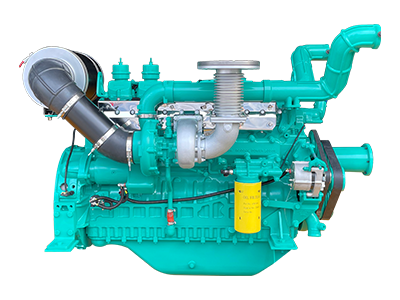- HOME
- ABOUT GOOGOL
- PRODUCTS
DIESEL ENGINE
GENERATOR SETS
- DOWNLOAD
- CASES
- NEWS
- CONTACT US
DIESEL ENGINE
GENERATOR SETS

As a core component, the cylinder block of a diesel engine is subjected to multiple effects such as high temperature, high pressure and mechanical stress. The material selection of this block has a decisive impact on its heat dissipation performance and durability. Due to differences in thermal conductivity, strength, corrosion resistance and other properties, different materials exhibit different performance during the operation of the engine.
The thermal conductivity of the material directly affects the heat dissipation efficiency of the cylinder block. Cast iron is a commonly used material for the cylinder block of traditional diesel engines, with a thermal conductivity of approximately 46-92 W/(m · K), which can effectively conduct the heat generated by combustion to the coolant. However, cast iron has a relatively high density, which will increase the overall weight of the engine. In contrast, aluminum alloy materials stand out with their high thermal conductivity of 200-240 W/(m · K), which can quickly dissipate heat, helping to lower the operating temperature of the engine and reduce the risk of thermal fatigue of components caused by high temperatures. In addition, the density of aluminum alloy is only about one-third that of cast iron, with a significant advantage in lightweight, which can improve the fuel economy of vehicles. However, the heat resistance of aluminum alloys is relatively poor, and they are prone to thermal expansion and deformation under high-temperature working conditions. To make up for this deficiency, it is necessary to optimize the design of the cooling system and adopt special heat treatment processes.

The mechanical properties and chemical stability of the materials are related to the durability of the cylinder block. Cast iron cylinder blocks, due to their presence of flake or spherical graphite structures, possess excellent shock absorption and wear resistance. When subjected to the impact and friction generated by the reciprocating motion of the piston, they can effectively reduce the wear rate and extend the service life. Meanwhile, cast iron has high chemical stability, strong corrosion resistance, and is not easily eroded by coolant and combustion products. Although the strength of aluminum alloy cylinder blocks is relatively low, by adding alloying elements such as silicon and magnesium and combining with forging or die-casting processes, the tensile strength can be increased to 300-400 mpa, meeting the working requirements of engines. To address the issue of poor wear resistance of aluminum alloy cylinder blocks, surface treatment techniques are often adopted, such as using micro-arc oxidation to form a ceramic layer on the inner wall of the cylinder block, or enhancing its wear resistance and corrosion resistance by embedding cast iron cylinder liners.
The application of new composite materials brings new possibilities for improving the performance of cylinder blocks. Fiber-reinforced metal matrix composites (MMCs) combine the toughness of metals with the high strength and high modulus of fibers. While maintaining good heat dissipation performance, they significantly enhance the strength and fatigue resistance of the cylinder block. For instance, the thermal conductivity of silicon carbide particle reinforced aluminum matrix composites can reach 180-220 W/(m · K), the tensile strength exceeds 450MPa, and the density is lower than that of cast iron. This can effectively reduce the weight of the engine, improve heat dissipation efficiency and durability. However, such materials currently have problems such as high manufacturing costs and complex processes, which limit their large-scale application.